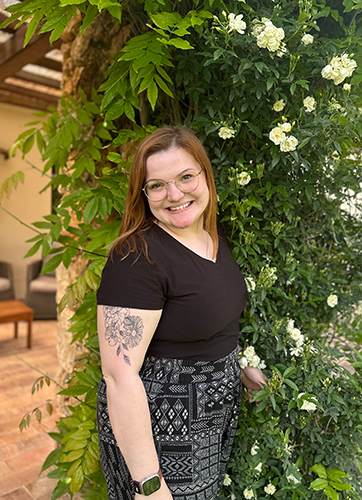Saturday marks a milestone in my life, as it does for my 1,500 fellow Rockets who are graduating from The University of Toledo.
Like all of us who walk the commencement stage tomorrow, I will celebrate my achievement: earning a master’s degree in educational psychology while living with the literal highs and lows of a chronic illness, Type 1 diabetes.

CELEBRATING SUCCESS: UToledo recognizes the Class of 2023 with a series of stories featuring students receiving their degrees at fall commencement.
While my illness may be invisible, it was always present while I was in grad school, always demanding attention and attempting to create roadblocks in my academic journey.
There were times when my illness won some of the battles. But I won the war.
My own experience with chronic illness and my transition from high school to college inspired my grad school journey and was the inspiration for my final master’s project.
When I was diagnosed with Type 1 diabetes at the age of 6, my doctor made it seem like I would never be able to accomplish anything.
That’s the furthest thing from the truth.
Through the help and support of family and friends, my adjustment to daily injections, blood sugar checks and medical devices became more bearable. Their support made it possible for me to focus on my academics, extracurriculars and making friends. I’ve spent my whole life becoming increasingly resilient, overcoming challenges and inspiring others to keep going.
Just looking at me, no one could tell I was battling a chronic illness demanding my attention all hours of the day. Besides the occasional sight of my insulin pump or blood sugar check, I could pass as a healthy individual. My resilience and work-ethic made me feel unstoppable.

Emily Cohoe is a UToledo marketing manager. She was diagnosed with Type 1 diabetes at the age of 6 and battled through her illness to graduate with a master’s degree in educational psychology.
After high school, I moved 300 miles away from home to begin my college journey. I had a decade of managing diabetes under my belt, was a high-achieving student and extremely adaptable. I was confident I could handle it on my own.
The feeling of being unstoppable quickly disappeared.
My first few months of college presented great challenges as I learned to adapt to university life, a rigorous academic program and the transition to living on my own.
I remember crying in my dorm room feeling like a failure; why was I struggling so much? Shouldn’t I be good at this college thing?
In hindsight, I failed to consider how juggling all these new norms would impact my mental and physical health.
The more stressed I got, the more my mental and physical health plummeted. When I was stressed, my diabetes was difficult to control, which lead to my grades falling, leading to even more stress. Very quickly, I was in this never-ending cycle of suffering. It got so severe that I thought about dropping out of college, and eventually, thought of taking my own life.
But people looked up to me. I needed to stay here, inspire others and prove to myself I can achieve greatness. I knew I needed help but didn’t know where to begin.
After seeking out counseling, academic support, joining a group for students with chronic illness and opening up about my struggles with chronic illness and mental health, my life became brighter and brighter.
Talking to my peers, I learned that other folks with chronic illness were having an unusually challenging time transitioning from high school to college. I was relieved to learn I was not alone.
While my life was not stress-free, I learned how to cope with life’s stressors, the importance of support and the power of self-advocacy and vulnerability. For the rest of my undergraduate years, I made it my mission to advocate for those struggling and to help students have a successful transition from high school to college.

Emily Cohoe, left, poses with a friend as they began their freshman year of college.
In 2019, I received my degree in family life education and community services, graduating with the highest honors. As I immediately entered the workforce after graduation, I realized my journey for helping college students was not over.
While working full time as an admissions counselor and helping high school seniors find their home at UToledo, I began my second academic journey of pursuing my master’s in educational psychology.
Once I completed my coursework and began my final project, I knew that somehow, in some way, I wanted to use my undergraduate experience as inspiration.
My final project, “Chronic Illness in Emerging Adults: The Effect on Mental Health and the College Experience,” examines the impact chronic illness has on student mental health and the college experience. The project’s goal was to empower chronically ill students with how to advocate for themselves and to educate universities on best practices for supporting students with chronic illnesses during their transition to college.
I never thought I would make it this far.
I constantly think of the 17-year-old Emily crying in her dorm room and think of how proud she would be of current Emily.
For my friends facing college with a chronic illness, please know that the journey is not only possible but worth the hard work, the tears and the triumphs. But you must find your support and advocate for yourself.
I did it.
And so can you.
Emily Cohoe is a UToledo marketing manager who is graduating with her master’s degree in educational psychology.